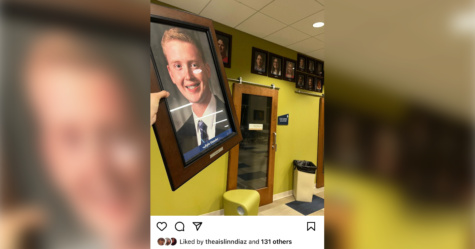So, You’re Graduating With A Technology Degree…
Graduates sitting in their gowns and hats during a graduation ceremony. | Photo Credit: Pixabay License
Dear Tech Graduates,
A word to the wise from someone who has been where you are: forget everything you think you know about technology because the reality is you are about to find out (as they say in the Game of Thrones) “you know nothing, Jon Snow.” In fact, I promise you, you will learn more in the first year or two on the job than you ever learned in higher education. It might surprise you to learn that being the Editor-in-Chief here at The Observer is not my only job, though it is one of my favorites! UIS is where I am doing my Master’s degree, but my Bachelor’s is a BS (Bachelor of Science) in Simulation and Digital Entertainment aka Video Game Development. Now, I would love to regale you all with some fabulous tales of the video game industry, but the only stories I have are awful, brutal, and made me leave the industry altogether. For those of you going into gaming, do your research, investigate the workplace culture, prepare for the most egotistical people you have ever met, and accept a completely skewed work-life balance. Now, if you are cool with that, awesome. I was not.
My personal feelings about the video game industry aside, allow me to tell you a bit about my career in technology. I graduated in 2017 from the University of Baltimore, but I was already working in the industry prior to my graduation. In 2015, I was working for a small web development firm in Towson, MD called DAASN. In 2016, while finishing the senior year of my undergraduate education, I worked for a company in Hunt Valley, MD called AmTote International, which had a gaming department. And well, I already surmised how that went, leaving out the part where they laid off 50% of my department – me included – literally the week I graduated with my degree. To say the least, it was very demotivating. Like many of us when we fail, I did soul searching to find my new path. I realized I did not want to go back into video games, but I love programming and development, so I decided to pursue software engineering roles instead.
It was rough when I first made the transition in my job search. In fact, many organizations would not take me as seriously since my degree was not technically in Computer Science, in the name. Nonetheless, after 10 months of grueling job searches (the industry was not as hot as it is right now with jobs) and picking up contract work, I finally got a job as a Junior Software Engineer with a company called Gunnison Consulting Group, headquartered in Alexandria, VA. Gunnison is a Federal Government contractor, this moved me and my whole life to DC, where I got a security clearance and ended up working on a pretty awesome contract over at the Census Bureau. While there, I helped develop their Listing and Mapping Application, which is an n-tiered system that they used to perform the 2020 Census and, as far as I know, are still using for their address canvassing operations that are ongoing. I learned a lot while there and credit much of my success to my very talented former co-workers and their amazing wealth of knowledge.
After three years at Gunnison, I left to pursue a career back in the private sector, where I took on my current job at a company called Logicworks, headquartered in New York City, where I work completely remote out of my home in DC! This was huge for me; I personally hate going into the office and am far more effective at getting things done when I work from home. If working from home is important to you, make sure the role you are looking at has that option. Anyways, that aside, I took on the role of Azure Platform Developer, and have since been working as a mid-level developer on a proprietary Azure Platform that we offer to our customers to who we provide managed cloud services. I was lucky enough to join a new team that had just been built from the ground up and had the chance to develop a brand-new platform without having to maintain a legacy system. Anyone who has had to maintain legacy code knows this is truly a dream. A side note: it is important you enjoy the people you work with; they can make or break an experience. I am very lucky and thankful I work with a wonderful inclusive team full of talented engineers.
Now excluding all that jargon and those buzzwords, I tell you this so that you know I have a bit of knowledge when it comes to what is currently happening in the tech industry, in the tech job market, and most importantly in the tech workplace. I got the offer for my current role back in June 2021. The difference in the job market between 2021 and 2018 was vast, every company I interviewed wanted me. For me, I was able to negotiate a fair salary, incredible benefits, high bonus targets, and other important non-compensation benefits. Now, this may also be because I had a few years of professional experience under my belt, some incredible references, a fine-tuned expert knowledge of .NET and Azure (a niche skillset for anyone interesting in pursuing a job in Windows technology stacks), and the ability to talk my way out of a paper bag. But, nonetheless, I remember what it was like to go in and interview for junior roles and I am going to share my knowledge with you.
My biggest piece of advice is if you do not succeed the first time, try and try again. In fact, do not put all your eggs in one basket, it can be one of the biggest wastes of your time. What I mean by that is, apply to many jobs, all the jobs, literally every job you may want to work. Line up as many interviews as possible, in fact, finding a job should be like a full-time job to you if you want to be as successful as possible. Personally, in my last job search, I literally had two to three job interviews set up daily, and I was still working my day job. While it was not fun nor easy to push through that schedule, it was rewarding in the end. So, trust me on this, and stack up those interviews, but make sure to remember where you are in each company’s pipeline; this is critical for when you start getting offers. Also, make sure to thank everyone you interview with, whether that be in written or digital form, you want to make sure you are the last thing on their mind when they are making the decision of who to make an offer to.
Now, let’s talk resumes. It would benefit you to do a little research on buzzwords and terms that automated resume checking software looks for, in relation to the specific job title you are applying for. If you want to make it past many of the initial resume checks, this is critical! Many people will tell you many things regarding the length of your resume, but I am here to give you my opinion: keep it to one page and use a nice template that can help you stand out from everyone else’s resume. No one wants to read a long resume and many people just graduating do not have much professional industry-related experience to showcase as it is. So instead, showcase your education, your certifications, your skills, your specific technical specialties, awards and organizational affiliations, and any type of related experience that can be worked into a conversation during an interview. For developers specifically, I suggest you have examples of projects you have done, and make sure to use best code practices, full comments, and showcase dynamic advanced computing techniques. It is easiest to have code-related projects uploaded to a platform like GitHub to be able to be easily shared with inquiring employers.
Let’s move on to my least favorite part of any technical interview, the tech challenge. Especially so for developers, but most technical jobs have some variety of this test. Remember earlier when I said, “you know nothing, Jon Snow!”? Well, these tech challenges can certainly remind you of that quickly. I cannot encourage you enough to make sure you have a working knowledge of whatever language you need to take the tech challenge in. There is nothing worse than being in the middle of a timed tech challenge and realizing you do not know anything about what they are asking. I have been there, I have felt stupid, and the anxiety to go along with it is overwhelming, to say the least. So, do yourself the favor and be honest, do not lie about your technical skills and expertise because they will find out, and you will put yourself through a rollercoaster of anxiety in the process.
That being said, tech challenges can be as easy as here is a repository to download, follow the prompt and complete the application code, resubmitting the final product back to the company. This type of tech challenge usually has a 2-7-day timeline for completion and is by far the easiest to complete, thanks to the lovely advent of Google! By the way, if you have not realized it yet, Google is your literal best friend as you move through your tech career. Do not worry, some other poor developer has had that error too, and most likely there is a solution online. However, there is also the timed and monitored tech challenge which you will see from many FAANG (Facebook, Apple, Amazon, Netflix, and Google other companies like Microsoft, Instagram, Twitter, and the like also fall into this category) companies. I cannot stress to you enough how difficult, annoying, and ridiculous these types of tech challenges are. If it is your absolute dream to work at a FAANG company (and I will come back to why it may not be later) then do yourself the solid and look online for articles about how to prepare for the tech challenge for that specific FAANG company and work with your corporate recruiter to prepare for it as well.
Now, do you actually want to work for a FAANG company or do you really just want to land a job in development with a decent company? This is a very critical personal question and while I cannot answer it for you, I can provide you my perspective from experience. I thought for a little while that I might want to work for a FAANG company, I applied with Google, Facebook, and Amazon. I made it through to interviews with Google and Facebook, but ultimately my skill set did not match what they were looking for in those roles. But Amazon was absolutely horrific. The tech challenge was incredibly difficult as it basically involved redeveloping, from scratch, various advanced algorithms like, for example, a bubble sort or n-node trees. Oh, fun fact, you cannot access search engines, language documentation, or even leave the window while you are taking the test. Personally, I do not know a single developer who has not had to use language documentation or search engines to figure out information on the fly while they are programming, as it is just literally impossible to remember every single code library on the top of your head.
So, if this is truly your dream, prepare for a grueling and difficult tech challenge and lean on people who work at the organization or your recruiter for tips on how to properly prepare. If you cannot get past the tech challenge you will never get to an interview – sad but true. Another point to know about FAANG companies, if you get an offer, the first couple of years (especially as a junior level developer) are extremely difficult. They often involve long hours with no overtime (oh, hello salary, my old friend) and high expectations for product delivery. So, do not say I did not warn you about it. Additionally, if you get a role with a FAANG organization, expect the first three to six months will be strictly onboarding with very little development, in this interim stay sharp on your coding skills! Remember practice makes perfect and it is very easy to forget complex coding techniques if we do not practice them, I say this from experience.
Now let’s say a FAANG company is not in your future, but you still want to end up at a good organization. Again, do your research. For all companies you apply to, find out everything about them. How they started, what they do, their profitability, who works there, employee happiness, diversity and inclusion policies (important to me), and any other important decision-making information you may want to know. Additionally, use your resources, look them up on Glassdoor, and read all the reviews and any listed salary information. Use your best discretion when reading reviews, but typically a lot of negative reviews are a huge red flag. Remember, while having a job is important, being happy with your job is more important, take this from someone who spent years and years learning it. Work-life balance does not seem so important to a new entrant into the job market but let me assure you, it is critical to your future mental health.
Ok, so let’s say you have made it past the recruiter, passed the tech challenge, and you are onto a series of interviews (panel or otherwise), firstly congrats, you are killing it! Secondly, you have made it past the “hard part,” technically speaking, but here are a few tips for me on interviewing. Not all of us are extroverted social butterflies like me, and I get that, so for you, this may truly be the hard part. However, I promise these tips are tried and true, I have been through hundreds of interviews, and I always employ these skills in some variety or another.
My first tip is the same thing I am sure you all have heard a million times: be yourself. The last thing someone wants when interviewing you is to see some curated personality that does not belong to you. People are more astute than you think, and they will pick up on this – avoid the awkward and just be yourself! At the end of the day, you do not want to work with people who do not like you! My second tip is, slow down, and not talk a million miles per hour despite how nervous you may be. Slow down, talk in a calm cadence, and be careful not to throw too much at the interviewer before they can digest what you said.
My third tip: make it a conversation. Too many people go into interviews waiting to respond to a question, do not be like them. Make the interview a conversation, listen to the interviewer, add in personal anecdotes, give examples that relate to the subject matter they are asking about, be an active listener, and actually have a conversation. The interviewer does not want you to sound off answers like a pop quiz in a class, they want to see how you answer and get to know you, so back to my first tip, be yourself! My last tip, for the questions that stump you or catch you off guard: do not freak out! It is ok to take a moment as you think about how you want to respond to a difficult or tricky question. In fact, I would say be prepared for trick questions like, “tell me about a time you failed? What did you learn from this?” People want to see how you handle chaos and failures as much as they want to see how knowledgeable and great you are. At the end of the day, take a deep breath, remember this is just another person, and every interview is a chance to practice no matter if you get the job or not. So, take every opportunity to perfect those interviewing skills.
Finally, it is here, you have received an offer! Oh, how exciting! Obviously, we all want to receive an offer for the first role we apply to, but in reality, that rarely happens when applying for your first role post-graduation. In fact, you may hear a lot of NOs before you get a yes, and that is ok! This is part of the process, but when you do finally get a yes, and the offer letter has been received this is when the fun begins. Make sure you review your offer letter in detail and read all the fine print no matter how laborious this may be. If you are uncertain regarding any of the terms of employment consult the internet or a lawyer if you happen to know one. Never agree to anything that violates your own personal code of ethics, you will have to fight through that issue every day you work and it is no fun. One nuanced note on this, pay attention to any and all “probationary” period clauses, many organizations have them, and usually, they entail an easy way for an organization to fire you during that period if you are not performing up to their expectations. If one of these clauses exists, make sure you are fully understood on what it means and what the expectations of you are during that period.
After you have reviewed all the terms of employment, make sure to review your salary, benefits (including waiting or “probationary” periods), non-compensation benefits, and role expectations. If everything is to your liking go ahead and accept the offer, however, if there is something not to your liking (like your salary) you can respond with a counteroffer and see what they are willing to agree to. Not all companies will negotiate with you on a counteroffer, but some may, it is a risk that you must decide for yourself if it is worth it to you.
So, you have accepted your offer and have a few “housekeeping tasks” to complete in the interim including but not limited to a background check and a reference check. Most importantly, stay calm and do not panic while these processes are completed. Sometimes they can take a couple of weeks, if you have no reason to worry, then do not. Also, if you have something that may cause issues on your background check, ALWAYS, make sure to let your new employer know. Not all issues are disqualifying but lying or misleading them will most definitely have your offer rescinded. Regarding references, get written letters and contact information for email or phone call follow-ups. Get a variety of references, someone you have worked for, a professor that may be knowledgeable about your skills, and anyone else that can speak highly on your work ethic or skills that are not your family members. Whatever you do, do not take your references lightly, this can make or break the final step of your job offer.
If you have made it this far then you should be rather prepared to jump out there into the job market and find yourself your first role! I have full confidence that you all will be successful if you put your effort into it. While the road may be bumpy, riddled with potholes, and missing guardrails you can navigate your own path and be successful. When you are feeling down on your own job search journey, when you are feeling demotivated and defeated, remember, it took me 10 months to find my next role between my stint in gaming and where I am today but if I can do it, you can certainly do it too. I wish you all the best of luck as you search for your first “career” job, and if you let it, it can be a rewarding process in itself. Now, go out there, find the jobs you want, and get those offers because they are not going to wait around for you. Like John F. Kennedy said, “We must use time as a tool, not as a couch,” so get off your couch and make this time – yours.












